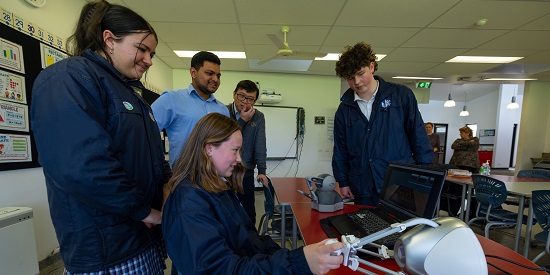Virtual haptics harnessed to teach STEM in regional and rural schools
Media release
Secondary students from Warrnambool and Heywood will have the chance to step into a virtual world and learn more about physics in a cutting-edge project aimed at inspiring more students to pursue careers in science and technology.
Deakin University researchers from the School of Education have teamed up with the university's School of Engineering and Institute for Intelligent Systems Research and Innovation to develop a VR-haptics in STEM platform in collaboration with teachers at Heywood and District Secondary College and Warrnambool College.
The research and development project is being rolled out as data reveals about 10 per cent of Australian students in Year 11 and 12 currently study science, technology, engineering and maths (STEM) subjects.
This is despite STEM organisations being among the fastest growing industries in Australia for future job prospects.
Associate Professor Julianne Lynch from Deakin's Research for Educational Impact (REDI) centre said virtual reality headsets were often used by young people for gaming and for training purposes, but their potential to aid academic learning had not been fully explored.
"This project gives students the opportunity to use technology in ways we haven't seen before in Australian classrooms," Associate Professor Lynch said.
"The virtual learning activities are fun and engaging and the project provides opportunities for regional and rural students to learn about technology that they wouldn't otherwise have access to."
As part of the project, students wear the headset and hold the haptic devices, becoming immersed in an interactive virtual laboratory.
Co-researcher Dr Van Thanh Huynh of Deakin's School of Engineering said that haptic feedback allowed students to ‘feel’ the virtual objects they manipulate in virtual experiments.
He said the project would build and test prototypes focused on magnetism, friction, and Newton's 2nd law of motion.
"The project will provide proof of concept for the design, as well as important practical insights for the application of the technology to school learning," Dr Huynh said.
The team hopes the program, funded by the Telematics Trust, will eventually be expanded to other Victorian schools. They are planning a teacher conference for later in the year so they can share their insights with other south-west Victorian schools.
"By engaging with these tools and conducting these experiments, we’re hoping students become more interested in science and technology," Associate Professor Lynch said.
"Our ultimate aim is to improve students' engagement and learning in these subjects and encourage more of them to take an interest in – and potentially one day pursue a career – in STEM."

